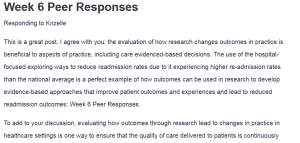Week 6 Peer Responses
Responding to Krizelle
This is a great post. I agree with you; the evaluation of how research changes outcomes in practice is beneficial to aspects of practice, including care evidenced-based decisions. The use of the hospital-focused exploring ways to reduce readmission rates due to it experiencing higher re-admission rates than the national average is a perfect example of how outcomes can be used in research to develop evidence-based approaches that improve patient outcomes and experiences and lead to reduced readmission outcomes: Week 6 Peer Responses.
To add to your discussion, evaluating how outcomes through research lead to changes in practice in healthcare settings is one way to ensure that the quality of care delivered to patients is continuously improved possibly and best meets their health needs. Through this, researching outcomes also ensures that future care practices are centered on the condition that the patient has been diagnosed with, therefore ensuring that the patient receives the best value of care (Pantaleon, 2019).
It also shapes the patient safety environment within healthcare settings by highlighting current effects and potential risks of current care practices and identifying interventions or alternatives to reduce or mitigate such risks and adverse effects. At the same time, it identifies gaps in intervention and strategy, leading to improved evidence implementation and better outcomes (Proctor et al., 2023).
For your project, researching the outcomes of using either GLP-1RAs or Metformin to manage insulin resistance and weight control in women with PCOS will help confirm the outcomes of each management regime. At the same time, the confirmatory evidence will guide future decisions in using either treatment option to manage insulin resistance and weight loss in women with PCOS.
References
Pantaleon, L. (2019). Why measuring outcomes is important in health care. Journal of Veterinary Internal Medicine, 33(2), 356–362. https://doi.org/10.1111/JVIM.15458
Proctor, E. K., Bunger, A. C., Lengnick-Hall, R., Gerke, D. R., Martin, J. K., Phillips, R. J., & Swanson, J. C. (2023). Ten years of implementation outcomes research: a scoping review. Implementation Science, 18(1), 1–19. https://doi.org/10.1186/S13012-023-01286-Z/TABLES/8
ORDER A PLAGIARISM-FREE PAPER HERE
We’ll write everything from scratch
Question 
PEER RESPONSE 1
BY: KRIZELLE
Evaluating how research changes outcomes in practice is beneficial in the clinical setting as it allows healthcare providers to make evidenced-based decisions to guide there care (Portney, 2020). Outcomes showcase the effectiveness of treatment and research demonstrates how various aspects of healthcare can produce certain outcomes. Evaluating outcomes in practice through research helps exhibit that changes in practice can be beneficial for patients despite it not being the conventionally accepted methods of treatment and care provided (Portney, 2020).
For example, if a hospital has been attaining higher re-admission rates than the national average, this outcome showcases that change is necessary within the hospital system to reduce the re-admission rates of patients. Furthermore, if a hospital has admitted a new discharge system that has shown to reduce re-admission rates than the national average, this outcome showcases how this new discharge system may be a beneficial implementation for other healthcare facilities.

Week 6 Peer Responses
In studying whether GLP-1RAs or Metformin is more effective in the management of insulin resistance and weight control in women with PCOS, the proposed change in practice supported by research would be the transition of using GLP-1RAs rather than Metformin for pharmacological management. Traditionally, Metformin has been the mainstay of pharmacological management of insulin resistance in women with PCOS (Lyu et al., 2021). However, evidence from numerous randomized controlled trials and meta-analyses has shown that GLP-1RAs are equally effective in glycemic control and more effective in weight control than Metformin for management of PCOS (Lyu et al., 2021; Xing et al., 2022).
To evaluate how the research supporting the use of GLP-1RAs is being implemented into current clinical practice, data must be collected from various healthcare organizations to see the rates of which healthcare providers are prescribing GLP-1RAs for PCOS in comparison to Metformin as initial pharmacological management.